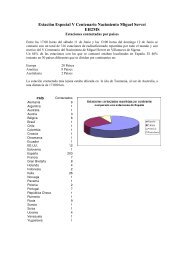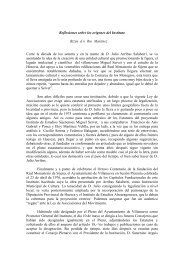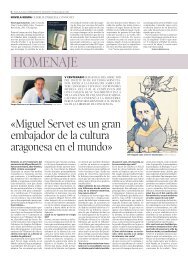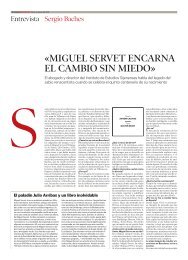New Page
New Page
New Page
Create successful ePaper yourself
Turn your PDF publications into a flip-book with our unique Google optimized e-Paper software.
formulated syllogisms that exposed the Trinity, but also attempted to outline a minimal program<br />
acceptable even for Melius and his circle. Thus during the debate of his creed, which he said on the sixth<br />
day, he declared the following about Christ. +We do not say that he was the son of God by predestination<br />
but that he was a real and present son with respect to the father, for whom everything is real and present.<br />
For us, however, he existed hidden and as a secret."142 The solution proposed here, i.e. the Son existing<br />
really in the Old Testament with respect to the Father but not to men, was not acceptable for either party.<br />
Melius and his friends saw merely a trap in this, and Gáspár Békes, an aristocrat on the Antitrinitarians'<br />
side accused the Italian physician of inconsistency. Of course, it was not inconsistency but merely the<br />
quest for a solution acceptable for the opponents. (Yet, this detail has come down in Transylvanian<br />
Unitarian church historiography as Blandrata's wavering, and related to the role the Italian would play in<br />
the conviction of Ferenc Dávid in 1579.)<br />
On the other hand, it can be observed that the Antitrinitarian party was far from representing a<br />
unified view, expressing opinions once in the spirit of Servet, then again in that of the new Christology. A<br />
case in point was the relationship of the two creations and the spiritual nature of the second. Pál Gyulai<br />
said that the Bible never claims that Christ was the creator of the universe, therefore the omnia in John's<br />
gospel cannot refer to both creations, and the creation by Christ is not the shaping of the universe but the<br />
spiritual renewal of the faithful. Blandrata, also in this phase of the debate, was trying to find solutions<br />
that would ensure the transition from the old to the new notion, namely that Christ was creator a<br />
creatore. István Basilius at the same time accepted that Christ had recreated both the heaven and the earth<br />
and Ferenc Dávid used similar expressions: +...Because of sin, for every creature had become corrupted,<br />
even the heaven and the earth, it was necessary that they also get rid of corruption through Christ."143 It<br />
caused further complications that wishing to avoid the charge of making two creators, two gods, Dávid<br />
elsewhere diverged from this attitude, also suggested in Rövid útmutatás, and seemed inclined to accept<br />
the purely spiritualistic character of the second creation. This, however, did not make his situation easier,<br />
indeed, it lead to new fierce clashes as to which of the celestials had to be reconciled with God. A lengthy<br />
debate ensued here on the nature of the angels, on the question whether they had been corrupted or<br />
remained pure (no answer was found, of course) and the Hungarian Antitrinitarian was obliged to admit<br />
that he was not able to support his position with arguments. +We have entirely failed, unlike the angels;<br />
but even the angels are not so perfect that they can stand before God without Christ as head. But we<br />
cannot know why this is so."144<br />
All this shows very well that the Antitrinitarians did not wish to sharpen the points of the<br />
questions under debate since they had come to Gyulafehérvár with the intention to convert Melius and his<br />
friends to a version of a moderate Antitrinitarianism. This can be observed in the events of the last two<br />
days when the first chapter of John's gospel was discussed. The explication put forth by Ferenc Dávid as<br />
the premises of the debate strictly insisted on using such theological considerations only that had been<br />
raised during the earlier discussions. Thus it was perfectly logical that he himself did not bring new<br />
aspects into the debate. This, of course, followed from their tactics of trying to make Melius and his<br />
followers appear as the disrupters of union because it was they who had returned to the use of the<br />
extrabiblical technical terms already denied earlier. Melius and his friends, however, saw by then that<br />
they had made a mistake and they chose the tactics of intensifying the controversies. They wanted to<br />
create situations where the Antitrinitarians could not leave anything unsaid. It was in these terms that<br />
Melius gave his very lengthy answer saying that the apostle John wrote his gospel against Ebion and<br />
Cerinthus, who denied Christ's eternal existence. From the protocols it turns out that Dávid's reply<br />
minutely listed the biblical passages interpreted by Melius and before he could really have got in his<br />
speech, enlivened by verbal altercation, and answered the said argument, Mihály Csáki, at the order of the<br />
Prince, put an end to the religious dispute. So it would seem that the Antitrinitarian protocols of the<br />
debate are telling the truth when it says that they are attaching the adequate answer in an appendix only.<br />
The answer ran in the following way:<br />
+Cerinthus and Ebion, unlike Melius, held that the Man Christ had not been deified before Mary.<br />
46







